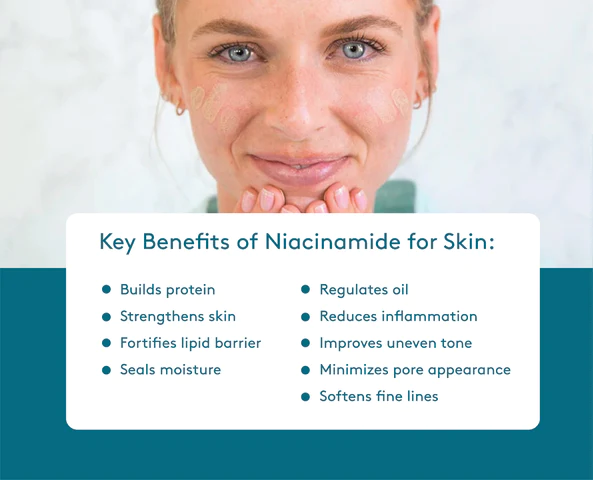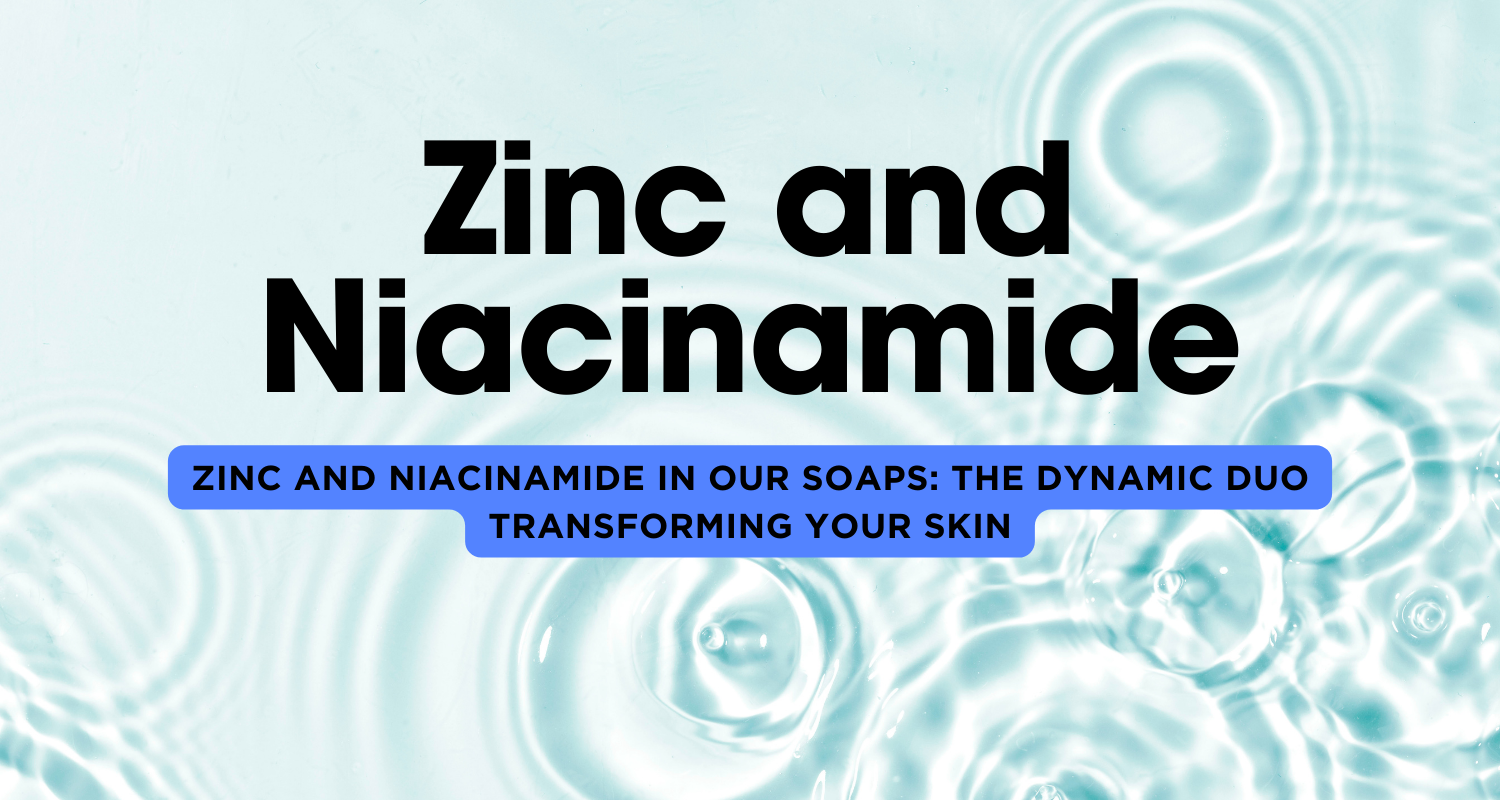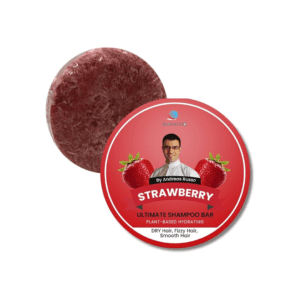Introduction
Zinc and niacinamide are two essential ingredients in skincare that provide a wide array of benefits for all skin types. Both have been used for decades in skincare formulations due to their multifaceted properties that address common skincare concerns like acne, dullness, aging, sensitivity, and dehydration. When used together in skincare products like soaps, zinc and niacinamide can pack a powerful punch in improving skin health and appearance.
Zinc is a mineral that plays a fundamental role in overall skin health and immunity. It contributes to cell growth, wound healing, oil regulation, and inflammation control. Niacinamide, also known as vitamin B3, is a water-soluble vitamin that provides numerous benefits to the skin. It improves skin elasticity, evens out skin tone, enhances the skin barrier, and reduces the appearance of wrinkles and redness.
The unique combination of these two ingredients makes them a dynamic duo in skincare. Let’s explore the key ways that zinc and niacinamide work together to transform your skin.
Zinc’s Role in Skin Health
Zinc is an essential mineral for overall health and plays a critical role in skin health and function. It has natural antibacterial and anti-inflammatory properties that make it highly beneficial for treating several common skin conditions.
Zinc acts as an astringent, helping tighten pores and control excess oil production. This helps prevent acne breakouts by limiting the growth of p. acnes bacteria in pores. Zinc also has wound healing abilities, stimulating skin cell regeneration and reducing inflammation from acne. Its antibacterial effects help eliminate bacteria on the skin that can cause flare-ups.
Studies show both oral and topical zinc preparations can significantly reduce inflammatory acne lesions. The mineral limits p. acnes proliferation and decreases skin inflammation through regulating cytokine production. Daily oral zinc supplements combined with topical application provide optimal results.
Zinc deficiency can manifest with skin inflammation, impaired wound healing, and decreased immune defenses. Ensuring adequate zinc intake and application supports overall skin health and helps treat several prevalent skin disorders. Its antibacterial properties make zinc a versatile mineral for improving skin function and appearance.
Niacinamide for Brighter Skin
Niacinamide, also known as vitamin B3, is a powerhouse ingredient for achieving brighter, more even toned skin. It works by inhibiting the transfer of melanosomes, tiny packets of melanin, to keratinocytes. This helps reduce areas of hyperpigmentation and age spots by limiting the production of excess melanin.
Niacinamide also blocks the enzyme tyrosinase, which catalyzes the first reaction in melanin synthesis. By decreasing tyrosinase activity and melanosome transfer, niacinamide keeps hyperpigmentation at bay. It’s especially effective at fading discoloration related to sun exposure and acne.
With its twin abilities to inhibit melanosome transfer and tyrosinase activity, niacinamide in skincare helps create a clearer, more luminous complexion. It reduces dullness and uneven texture for skin that simply glows. Our soaps containing niacinamide brighten the complexion while gently cleansing.
Acne-Fighting Abilities
Zinc and niacinamide are a dynamic duo when it comes to fighting acne. Zinc is a mineral that plays a key role in skin health and wound healing. It has natural antibacterial and anti-inflammatory properties that help control acne-causing bacteria and reduce redness and swelling associated with breakouts.
Niacinamide is a form of vitamin B3 that also exhibits anti-inflammatory effects. It helps regulate sebum production, keeping oiliness under control. Excess sebum is one factor that clogs pores and leads to acne flare-ups. Niacinamide also improves skin moisture barrier function, which prevents the entrance of bacteria and controls breakouts.
Together, zinc and niacinamide work synergistically to treat and prevent acne. Zinc tackles bacteria while niacinamide reduces inflammation and sebum production. Including both ingredients in skincare and soap formulations provides a one-two punch against acne of all severities, from occasional pimples to chronic inflammatory acne. The anti-acne abilities of this dynamic duo make them must-have ingredients for clear, blemish-free skin.
Anti-Aging Effects
Zinc and niacinamide are both powerful anti-aging ingredients when used together in skincare. They help boost collagen production, leading to firmer, more youthful-looking skin.
Collagen is essential for skin’s elasticity and strength. As we age, collagen breaks down more rapidly, causing wrinkles and sagging. Zinc stimulates collagen production by regulating fibroblasts, the cells that make collagen. This helps maintain skin’s firmness.
Niacinamide also promotes collagen in two key ways. First, it inhibits the enzyme that breaks down collagen. Second, it boosts circulation and nutrients to skin cells, enhancing their ability to make new collagen.
Together, zinc and niacinamide enable skin to produce more collagen over time. This strengthens the dermis layer, reducing fine lines and wrinkles. Regular use can make skin look plumper and more supple.
The anti-aging benefits also come from decreasing inflammation and free radicals. Zinc is a powerful antioxidant that neutralizes free radicals. Niacinamide reduces inflammation and redness. This protects skin from oxidative damage that accelerates aging.
With consistent use, zinc and niacinamide in skincare deliver remarkable anti-aging results. Wrinkles appear diminished, skin texture looks smoother, and skin regains a more youthful resilience.

Soothing Sensitive Skin
If you suffer from sensitive skin that is easily irritated or inflamed, zinc and niacinamide can provide soothing relief. Zinc is a natural anti-inflammatory agent that helps calm and reduce redness. It inhibits the release of substances in the skin that cause inflammation. This makes it effective for sensitive conditions like rosacea.
Niacinamide also has anti-inflammatory properties to help soothe irritation. It helps strengthen the skin barrier function, making skin less reactive. This mineral duo works together to minimize sensitivity triggers like redness, stinging, and itchiness.
With continued use, zinc and niacinamide can help train your skin to become more tolerant and less prone to flare ups. Their calming benefits make them ideal for gentle, daily cleansing of sensitive complexions. Formulated into a mild soap, zinc and niacinamide cleanse effectively while still being kind to easily aggravated skin.
Enhanced Moisture Retention
One of the top benefits of zinc and niacinamide is their ability to boost hydration and moisture retention in the skin. Both ingredients are highly effective at repairing and strengthening the skin barrier. This outer layer of the epidermis acts like a shield, limiting moisture loss while keeping irritants out.
When skin is dry and dehydrated, it’s often because the barrier has been compromised. This allows vital moisture to escape at a rapid rate. Environmental factors like cold weather and indoor heating can make matters worse, zapping natural oils.
Zinc and niacinamide work together to reinforce the skin’s barrier and prevent transepidermal water loss. Niacinamide increases the production of ceramides and fatty acids that maintain the barrier’s structure. Zinc also regulates sebum, keeping oil flow in balance so skin doesn’t get too dry.
With a fortified moisture barrier, skin is better able to retain hydration. Cells stay plump and hydrated rather than parched and shriveled. The result is a smoother, softer, more radiant complexion. Those with dry skin types can particularly benefit from the moisturizing abilities of these two ingredients.
Formulating Effective Soaps
When formulating soaps with zinc and niacinamide, it’s important to use the right concentrations and balance to achieve maximum skincare benefits. Used together, these two ingredients have a synergistic effect, enhancing each other’s properties.
Niacinamide is typically used at concentrations of 2-5% in skincare formulations. Higher amounts like 5% tend to be more effective for reducing acne, fine lines, and hyperpigmentation. Zinc is often used around 1-2% concentration, as too much can be drying or irritating for some skin types.
Getting the ratio right allows zinc and niacinamide to work together in targeting acne and acne scarring. The zinc helps control excess sebum production and inflammation, while niacinamide repairs and strengthens the skin barrier.
Similarly, using them in combination supports anti-aging effects. Niacinamide boosts skin elasticity and reduces wrinkles and hyperpigmentation. The zinc provides antioxidant protection against free radicals and environmental damage.
When formulating, it’s also important to consider the combination of ingredients. Oil-based soaps allow for better absorption and bioavailability of zinc, while niacinamide mixes well in water-based soaps. A balanced approach optimizes the benefits of both ingredients.
Overall, the right concentrations and formulations of zinc and niacinamide in soap provide a powerful duo for transforming skin’s texture, tone, and clarity. Their synergistic effects make them ideal partners in effective skincare.
Choosing the Right Soap
With so many soap options on the market, it can be tricky to find ones formulated with zinc and niacinamide. Here’s what to look for on labels when shopping for skin-nourishing soaps:
Concentrations: Make sure the soap lists the percentages of zinc and niacinamide. You’ll typically want at least 1-2% zinc and 2-5% niacinamide for noticeable effects. Higher concentrations within these ranges are ideal.
Quality ingredients: Opt for soaps made with natural moisturizers like coconut, olive or almond oils. Avoid soaps with harsh sulfates, parabens, artificial fragrances and dyes.
Skin type suitability: Look for labels that specify the soap is suitable for your skin type, whether oily, dry, sensitive or acne-prone. Some soaps are tailored to certain conditions.
Format: Bar soaps, liquid hand soaps, body washes and facial cleansers can all contain zinc and niacinamide. Choose the format you find most convenient.
Brand reputation: Stick to reputable brands known for quality ingredients and transparency. Look for independent testing and certifications.
With attentive label reading and brand research, you can find the right zinc and niacinamide soap to transform your skin. Don’t settle for products with mystery ingredients or minimal active levels. Seek out optimal formulations.
The Takeaway
Zinc and niacinamide are two ingredients that pack a powerful punch for skin health. When used together in skincare products like soaps, they provide a dynamic duo of benefits:
They fight acne and blemishes by controlling excess oil and sebum production and reducing inflammation. The antimicrobial properties also keep skin clear of bacteria.
They brighten skin tone and reduce signs of sun damage and aging. Niacinamide improves skin elasticity while zinc lightens hyperpigmentation.
They calm and soothe sensitive, irritated skin. The anti-inflammatory effects reduce redness and irritation.
They enhance moisture retention in the skin by strengthening the skin barrier. This keeps skin hydrated, smooth, and supple.
They are gentle enough for daily use while still delivering dramatic improvements in skin’s texture, tone, and clarity.
The research shows that these two ingredients work better together than alone. By formulating them into natural soaps, you can unlock their full potential daily. Expect to see clearer, brighter, balanced skin over time.





